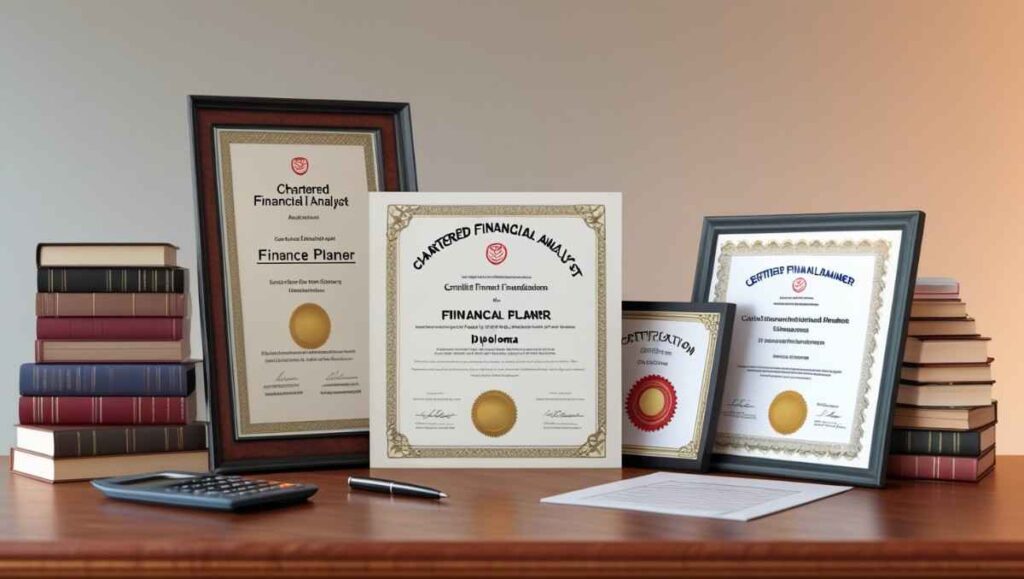
In the fast-paced world of finance, staying ahead requires more than just experience—it demands recognized expertise. Professional certifications not only validate your skills but also open doors to higher salaries, leadership roles, and global opportunities. Whether you’re an accountant, financial analyst, or risk manager, the right certification can be a game-changer for your career.
But with so many options available, how do you choose the best one for your goals? In this guide, we’ll break down the top 10 finance certifications, their benefits, ideal career paths, and even some surprising alternatives. By the end, you’ll have a clear roadmap to advancing your financial career.
01. CPA – Certified Public Accountant
If you’re in accounting, the CPA (Certified Public Accountant) is arguably the most prestigious certification you can earn. Offered by the US State Boards of Accountancy, this credential is essential for professionals handling audits, tax advisory, and financial reporting.
Why Get a CPA?
- High Demand: CPAs are sought after in public accounting firms, corporations, and government agencies.
- Career Flexibility: From forensic accounting to CFO roles, CPAs have diverse opportunities.
- Higher Earnings: On average, CPAs earn 25% more than non-certified accountants.
Who Should Pursue It?
- Auditors
- Tax Consultants
- Financial Controllers
Notable CPAs: Tim Cook (Apple CEO), Sheryl Sandberg (Former Meta COO)
02. CMA – Certified Management Accountant
The CMA (Certified Management Accountant), administered by the Institute of Management Accountants (IMA), focuses on financial planning, analysis, and decision-making. Unlike CPAs, CMAs specialize in corporate finance rather than public accounting.
Why Get a CMA?
- Global Recognition: Over 140,000 professionals hold this certification.
- Strategic Impact: CMAs drive business decisions through cost management and budgeting.
- Faster Career Growth: Many CMAs advance to CFO and senior finance leadership roles.
Who Should Pursue It?
- Financial Analysts
- Corporate Finance Managers
- FP&A Professionals
Notable CMAs: CFOs of Intel, Procter & Gamble
03. CFA – Chartered Financial Analyst
For those in investment banking, asset management, or hedge funds, the CFA (Chartered Financial Analyst) is the gold standard. Offered by the CFA Institute, this rigorous program covers portfolio management, equity research, and ethics.
Why Get a CFA?
- Prestige: Only about 20% of candidates pass all three levels on the first try.
- High Earnings: CFAs in hedge funds and private equity often earn six-figure salaries.
- Global Mobility: Recognized in 170+ countries.
Who Should Pursue It?
- Investment Bankers
- Portfolio Managers
- Equity Researchers
Notable CFAs: Warren Buffett (Berkshire Hathaway), Abigail Johnson (Fidelity Investments)
04. FMVA – Financial Modeling & Valuation Analyst
If you love financial modeling, valuation, and Excel, the FMVA (Financial Modeling & Valuation Analyst) from the Corporate Finance Institute (CFI) is perfect. Unlike the CFA, the FMVA is practical and hands-on, focusing on real-world applications.
Why Get an FMVA?
- Job-Ready Skills: Learn DCF modeling, M&A analysis, and LBO modeling.
- Faster Completion: Can be earned in 3-6 months (vs. years for CFA/CPA).
- Ideal for Banking: Highly valued in investment banking and private equity.
Who Should Pursue It?
- Investment Banking Analysts
- Private Equity Associates
- Corporate Finance Professionals
FMVAs at: Goldman Sachs, Morgan Stanley

05. FRM – Financial Risk Manager
In today’s volatile financial markets, risk management has become more critical than ever. The FRM (Financial Risk Manager) certification, offered by the Global Association of Risk Professionals (GARP), is the gold standard for professionals specializing in identifying, analyzing, and mitigating financial risks.
Why Earn an FRM?
- High Demand: With increasing regulatory scrutiny, banks and financial institutions are actively hiring FRM-certified professionals.
- Global Recognition: The FRM is respected worldwide, making it ideal for professionals seeking international opportunities.
- Lucrative Salaries: FRM holders often earn 20-30% more than their non-certified peers in risk management roles.
Who Should Pursue It?
- Risk analysts
- Compliance officers
- Hedge fund managers
FRMs at Work: JPMorgan Chase, PwC, BlackRock
06. FPAC – Certified Corporate FP&A Professional
If you’re passionate about financial planning & analysis (FP&A), the FPAC (Certified Corporate FP&A Professional) from the Association for Financial Professionals (AFP) is your ticket to career advancement. This certification focuses on budgeting, forecasting, and strategic decision-making.
Why Get FPAC Certified?
- Strategic Influence: FPAC holders play a key role in shaping business strategy through data-driven insights.
- Growing Field: FP&A roles are expanding rapidly, with 15% projected growth over the next decade.
- High Earning Potential: Senior FP&A professionals with this certification can earn $120K+ annually.
Who Should Pursue It?
- Financial Planners
- Business Analysts
- Corporate Finance Managers
FPACs at Top Firms: Amazon, Microsoft, Google
07. CA – Chartered Accountant
The CA (Chartered Accountant) designation is one of the most prestigious accounting qualifications worldwide, offered by local institutes of chartered accountants in various countries (e.g., ICAEW in the UK, ICAA in Australia).
Why Become a CA?
- International Mobility: CAs are recognized in over 180 countries, making it ideal for global careers.
- Versatile Career Paths: From audit to advisory, CAs work in diverse sectors.
- Strong Earning Power: Senior CAs at Big 4 firms earn $150K+.
Who Should Pursue It?
- Auditors
- Tax Consultants
- Financial Controllers
CAs at Leading Firms: KPMG, Deloitte, EY
08. ACCA – Chartered Certified Accountant
The ACCA (Chartered Certified Accountant), offered by the Association of Chartered Certified Accountants, is perfect for finance professionals seeking a globally recognized qualification with flexibility.
Why Choose ACCA?
- Flexible Exam Structure: Unlike CPA, ACCA allows you to take exams at your own pace.
- Broad Curriculum: Covers financial reporting, taxation, audit, and strategic leadership.
- High Demand: ACCA members work at top firms like HSBC, PwC, and Unilever.
Who Should Pursue It?
- Aspiring CFO’s
- Financial Consultants
- Audit Professionals
ACCA Holders at: Ernst & Young, BP, Shell

09. CIA – Certified Internal Auditor
The CIA (Certified Internal Auditor), administered by the Institute of Internal Auditors (IIA), is the only globally recognized certification for internal auditors.
Why Get a CIA?
- Regulatory Importance: With stricter corporate governance laws, CIAs are in high demand.
- Career Stability: Internal audit roles are recession-resistant.
- Strong Salaries: CIAs earn 90K–90K–130K on average.
Who Should Pursue It?
- Internal Auditors
- Compliance Officers
- Risk Managers
CIAs at Major Companies: Nike, Pfizer, Coca-Cola
10. CTP – Certified Treasury Professional
The CTP (Certified Treasury Professional), offered by the Association for Financial Professionals (AFP), is the leading certification for treasury and cash management professionals.
Why Earn a CTP?
- Critical Role: Treasury professionals ensure liquidity and manage financial risks.
- High Demand: Companies like Bank of America and Citibank actively hire CTPs.
- Competitive Salaries: Senior treasury managers earn 110K–110K–160K.
Who Should Pursue It?
- Treasury Analysts
- Cash Managers
- Corporate Finance Specialists
CTPs at Leading Banks: JPMorgan, Citigroup, HSBC

Bonus: Choosing the Right Certification (A Step-by-Step Guide)
With so many options, selecting the right certification can be overwhelming. Here’s a simple framework:
- Define Your Career Goals
- Want to be a CFO? → CMA or CPA
- Interested in investments? → CFA
- Love risk management? → FRM
- Consider Time & Cost
- Fastest to complete? → FMVA (3-6 months)
- Most affordable? → FPAC or CTP
- Longest but most prestigious? → CFA (3+ years)
- Check Employer Preferences
- Big 4 accounting firms? → CPA or CA
- Investment banks? → CFA or FMVA
- Talk to Professionals
- LinkedIn is a great place to connect with certification holders.
Which path will you take?
- Traditional Route: CPA, CFA, FRM (Best for long-term career growth)
- Accelerated Learning: FMVA, FPAC (Ideal for quick career boosts)
Key Takeaways
✔ CPA = Best for accountants & auditors
✔ CFA = Top choice for investment professionals
✔ CMA = Ideal for corporate finance leaders
✔ FMVA = Fast-track for financial modeling experts
Frequently Asked Questions (FAQs)
1. Which finance certification has the highest salary?
→ CFA (especially in hedge funds and private equity).
2. Can I switch careers with a finance certification?
→ Absolutely! Many professionals use the FMVA or CFA to break into investment banking.
3. Are online finance courses worth it?
→ Yes—if they offer practical skills, mentorship, and industry recognition.
Which certification aligns with your career goals? Let us know in the comments!





